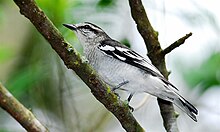The pied triller (Lalage nigra) is a species of bird in the cuckooshrike family Campephagidae. It is found in Brunei, India, Indonesia, Malaysia, the Philippines, Singapore, and Thailand.
| Pied triller | |
|---|---|

| |
| Scientific classification | |
| Domain: | Eukaryota |
| Kingdom: | Animalia |
| Phylum: | Chordata |
| Class: | Aves |
| Order: | Passeriformes |
| Family: | Campephagidae |
| Genus: | Lalage |
| Species: | L. nigra
|
| Binomial name | |
| Lalage nigra (Pennant, 1781)
| |
Taxonomy
editIn 1760 the French zoologist Mathurin Jacques Brisson included a description and an illustration of the pied triller in the second volume of his Ornithologie based on a specimen that had been collected in the East Indies. He used the French name Le Merle des Indes and the Latin name Merula Indica.[2] Although Brisson coined Latin names, these do not conform to the binomial system and are not recognised by the International Commission on Zoological Nomenclature.[3] In a section of a book by Johann Reinhold Forster published in 1781 the Welsh naturalist Thomas Pennant coined the binomial name Turdus niger for the pied triller and cited Brisson's work.[4] In 1922 the type location was restricted to Singapore by the American zoologist Outram Bangs.[5][6] The pied triller is now one of 20 species placed in the genus Lalage that was introduced in 1826 by the German zoologist Friedrich Boie.[7]
Three subspecies are recognised:[7]
- L. n. davisoni Kloss, 1926 – Nicobar Islands
- L. n. striga (Horsfield, 1821) – Malay Peninsula, Sumatra, Nias (west of north Sumatra), Bangka and Belitung (east of south Sumatra), Java, Karimunjawa (north of central Java) and Bali
- L. n. nigra (Pennant, 1781) – Borneo and satellites and Philippines
Gallery
edit-
Pied triller, Kuala Selangor, Malaysia, Aug 1994
-
Lalage nigra striga female
References
edit- ^ BirdLife International (2018). "Lalage nigra". IUCN Red List of Threatened Species. 2018: e.T22706651A130421238. doi:10.2305/IUCN.UK.2018-2.RLTS.T22706651A130421238.en. Retrieved 12 November 2021.
- ^ Brisson, Mathurin Jacques (1760). Ornithologie, ou, Méthode Contenant la Division des Oiseaux en Ordres, Sections, Genres, Especes & leurs Variétés (in French and Latin). Vol. 2. Paris: Jean-Baptiste Bauche. pp. 248–250. The two stars (**) at the start of the section indicates that Brisson based his description on the examination of a specimen.
- ^ Allen, J.A. (1910). "Collation of Brisson's genera of birds with those of Linnaeus". Bulletin of the American Museum of Natural History. 28: 317–335. hdl:2246/678.
- ^ Pennant, Thomas (1781). "Specimen Faunulae Indicae". In Forster, Johann Reinhold (ed.). Indische Zoologie oder systematische Beschreibungen seltener und unbekannter Thiere aus Indien (in Latin and German). Halle, Germany: Johann Jacob Gebauer. pp. 39–42 [41].
- ^ Bangs, Outram; Penard, Thomas E. (1919). "Notes on Philippine birds collected by Governor W. Cameron Forbes". Bulletin of the Museum of Comparative Zoology. 65 (4): 77–84 [80].
- ^ Mayr, Ernst; Greenway, James C. Jr, eds. (1960). Check-List of Birds of the World. Vol. 9. Cambridge, Massachusetts: Museum of Comparative Zoology. p. 197.
- ^ a b Gill, Frank; Donsker, David; Rasmussen, Pamela, eds. (July 2023). "Bristlehead, butcherbirds, woodswallows, Mottled Berryhunter, ioras, cuckooshrikes". IOC World Bird List Version 13.2. International Ornithologists' Union. Retrieved 14 December 2023.
